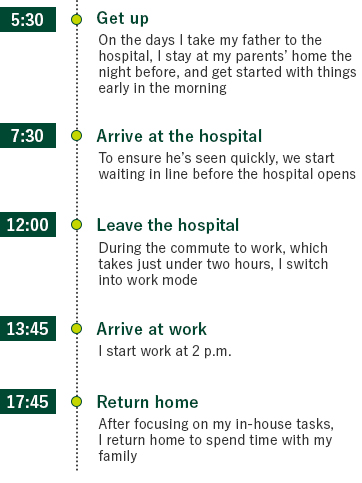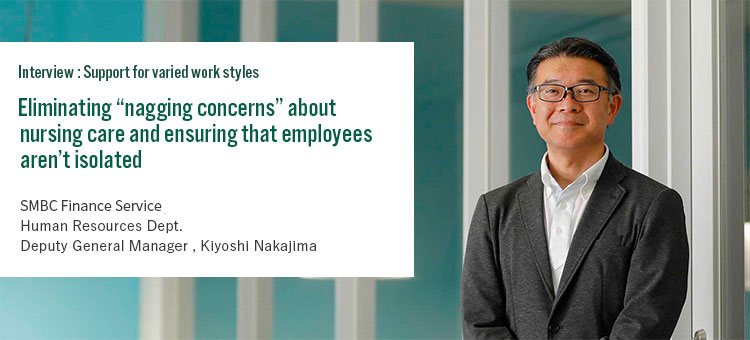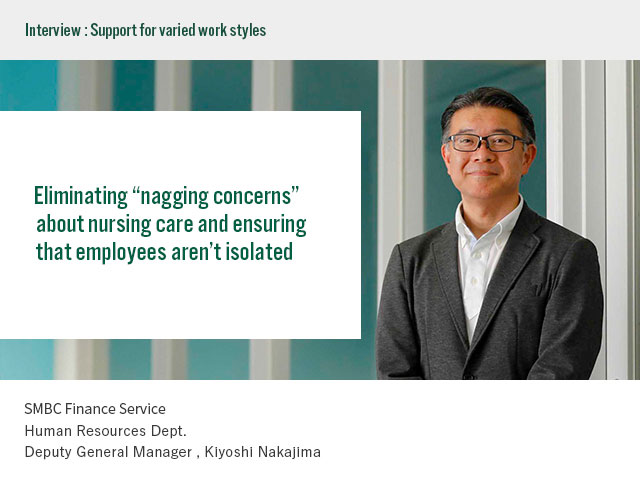※Departments and posts are as of the time of the interview(October 2019(formerly Cedyna Financial Corporation ))
※Cedyna Financial Corporation changed the name in July 2020 to SMBC Finance Service after merger with SMBC Finance Service
Related categories
For a company, experienced employees are an irreplaceable asset. SMBC Group offers a variety of schemes that enable employees who need to provide care to their family members to continue to pursue their careers with peace of mind. Here we meet a deputy general manager of a human resources department who promotes juggling nursing care with work. While reflecting on his own experience as a carer, he talks about the schemes available for facilitating that as well as the kinds of workplaces he would like to see established in the future.
When establishing policies, what’s important is to communicate information to the people concerned

“Our company has a lot of employees, both men and women, who are in their 40s to 50s, and they are active at various workplaces. However, while people in their 40s and 50s are in their most productive years, it’s at just around this time that they start to face the issue of caring for their parents. Against this backdrop, in 2017 we sent out an in-house questionnaire about nursing care to all employees. Of the 2,000 employees who responded, over half acknowledged that they “might need to provide nursing care in the future,” while 90% indicated that they have concerns about being able to balance work and nursing care. Our company provides extended nursing-care leave that can be taken in response to changes in the care needs of family members as well as short-term nursing-care leave that can be taken in hourly units. These leave schemes are more generous than statutory requirements call for. The company also posts relevant information on a portal site that can be viewed by employees at any time. Despite this, the survey results taught as the painful lesson that more employees than we’d imagined are struggling with concerns, that information provision and awareness raising by the company was still inadequate, and that we’re not there yet in terms of assuaging employees’ worries. In fact, the proportion of employees providing nursing care who are also taking advantage of our schemes was just 13%.
Nowadays, to facilitate the use of schemes like short-term nursing-care leave, we get employees, in advance, to check a box in the family information they register in the in-house computer system to the effect that they have a family member who requires nursing care. By having them check this box at an early stage, we can identify employees who might want to use nursing-care schemes. We’re also looking into the possibility of creating a system for providing timely information to persons who have registered in this way as future providers of nursing care.”
You can delay nursing care, but sooner or later it will be necessary

“Views on nursing care are often shaped by one’s own experiences. At the end of January 2016, my father was rushed into hospital with heart failure, and because I lived apart from my parents, I moved back my parents’ home so that I could provide support for him while he was in hospital. But I quickly noticed something odd about my conversations with my mother. I would later find out that she had been showing symptoms of dementia for some time. Apparently, my father had noticed the change in my mother, gathered information about nursing services that she could receive at home. He’d also consulted with a local support center. But then he himself fell ill. Since that day, I’ve been caring simultaneously for both my father and my mother.
To begin with, I didn’t know much about nursing care, so I began fumbling around trying to gather information. It was tough to coordinate everything with the facilities and all the other parties involved. But luckily for me, however, my parents’ home is only two hours away from where I live. So I thought that if I made use of paid leave and tried hard on my own, I would be able to get my parents accustomed to their new lives receiving care without the company or the people in the neighborhood even knowing. However, it wasn’t easy to keep up with my work and transform my public and private schedules. I felt that for a short period until the care plan was in place and had started running smoothly, it might be better to take a period of extended leave. And I think that it must be even tougher, in various ways, for people who live far from their parents and can’t go back and forth easily, or for people whose relatives require a high level of care.
Furthermore, a life with nursing care can’t go on without cooperation from municipal officers, care managers (specialists in the provision of nursing care) and other nursing-care professionals. One thing that stuck with me was when the care manager said, “Make sure you don’t make yourself sick as well. Don’t overdo it.” The more I found myself thinking that “these are my parents,” the more I seemed to feel that I had to fulfill by responsibilities as their son and handle things on my own. But certainly, if I got sick, there would be no one to take care of them. Even if they’re your parents, it’s important to maintain a sense of distance when considering their care, and to that end I felt that it’s important, including from a mental perspective, to involve a third party such as nursing-care professional. And to maintain a proper sense of distance between you and the nursing care, it’s also vital to keep on working. I feel that having a separate identity as a business person allows me, in a good sense, to reenergize myself.”
With this company, employees faced with needing to provide nursing careare not alone

“Nursing care is something that every one of us can face, and it’s often a long battle with no goal in sight. So if it’s an employee that wants to carry on working, I want to do my utmost to eliminate circumstances that would force them to quit their job on account of nursing care. Going forward, I hope that we will have even more ways of responding, including through support schemes, to the individual’s nursing-care circumstances and their feelings. It’s essential to consider the individual’s workload and be flexible about when and where they work. By enabling each individual to choose a work style that reflects their nursing-care environment and situation, I think the schemes we offer can become even easier to make use of. This diversification in terms of work-style choices is not limited to nursing care alone, and to enable employees in various different circumstances to continue working, we are promoting things like environmental improvements and teleworking to allow individuals to collaborate without being tied down by their work.
The schemes for promoting work-life balance that are currently available within the Group were born of the desire to ensure that nursing care isn’t only a burden for the individual concerned. The issue of nursing care is a private matter, so it might not be an easy thing to discuss. But I’d like to stress that if you want to continue working, it’s all the more important that you also inform your superior about your situation and how you feel about it. I also want you to have something other than the nursing care, such as your job or a hobby, to focus, and to not overexert yourself as an individual. In our human resources department, we want to be a presence that helps employees faced with nursing care to find a way to continue working.”
Not only has SMBC Group introduced schemes for supporting work-life balance that reflect the opinions of people with experience of providing nursing care, but we also recognize the importance of information about nursing care, and are endeavoring to expand opportunities for providing information, such as by organizing seminars and publishing guidebooks. And going forward, SMBC Group will continue to pay attention to the circumstances of each individual employee and do its utmost to help them balance their work with nursing care.
Daily schedule

Special memory

At the hospital waiting for my father to be seen. It’s crowded in the mornings, so I often stay at my parents’ house the night before.

All the files I’ve accumulated since I started providing nursing care. They contain documents I’ve gathered, care plans, and so on. This experience showed me just how important information is.



